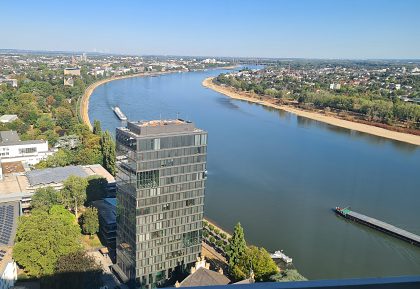
Our colleague Janka Szemesová has been a member of the prestigious group of international experts for the fourth year.
The United Nations Framework Convention on Climate Change (UNFCCC) has established several working or implementation groups that work in different areas of the Convention's scope. Their establishment was agreed by the Parties and their mandate was negotiated and approved according to the rules of the adopted decisions of the Conference of the Parties (COP). One of the oldest groups, established in 1999 by decision 8/CP.5, is the Consultative Group of Experts. The mandate of the CGE was extended by the Katowice decision 11/CP.24 until the end of 2026. The most recent decision, 14/CP.26 from COP26 in Glasgow, changed the composition of the CGE group experts and expanded their number by one member from a developing country from the Eastern European Group (EEG).
The mission of CGE is to help developing countries fulfil their reporting obligations, therefore the focus of CGE is technical and reporting, more than political or financial. The current challenge is the implementation of the Paris Agreement on Climate Change in Article 13, which talks about the Enhanced Transparency Framework (ETF). Equally important is the technical assistance of the UNFCCC Secretariat in implementing courses, trainings, workshops and other educational and awareness-raising activities in the field of technical implementation of reporting information on climate change, such as emissions, emission projections, policies and measures, goals and tools for achieving mitigation and transition to low or emission-neutral economies of developing countries. Support in conducting technical reviews and expert review teams is a matter of course.
The number of CGE experts, nominated by their states or regional groups, is determined by decisions and cannot be changed without negotiation and a new decision by the representatives of the Parties, within the COP negotiations. Currently, after several adjustments, the CGE has 22 members who are representatives of the following groups:
- 5 members from the developing countries of the Asian and Pacific Group.
- 5 members from the developing countries of the African Group.
- 5 members from the developing countries of Central and South America.
- 6 members from developed countries (Annex 1), while one member is from a country with Economy In Transition, which is Slovakia.
- 1 member from the developing countries of the Eastern European Group (former republics of the Soviet Union and post-socialist developing countries of Eastern Europe).
- Representatives and observers of international organizations, such as UNDP or IPCC, are also part of the negotiations. However, they do not have voting or other rights and usually speak only upon invitation or after agreeing on the agenda. You can find the list of experts here.
Our colleague Janka Szemesová was elected to the CGE in 2020. The last CGE meeting, which was the 11th in this mandate, took place at the beginning of February 2024 in Bonn. This meeting of experts was unusual due to the current complicated international relations caused by the war in Ukraine, led by the Russian Federation. At COP28, re-nominations of experts whose mandates had expired were blocked, not only from developed countries but also from Russia and Belarus. The meeting approved the work program for 2024 and emphasized intensive assistance to developing countries in preparing their first BTR* report.
*see our Glossary for abbreviations and terms
